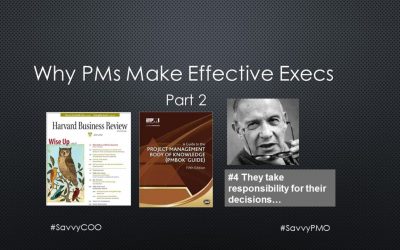I was recently interviewed by Central Desktop Blog on why good project managers get passed over for promotion. During that interview I emphasized how the skills of a good project manager match the skills needed for an effective executive.
So why do good project managers make great executives?
What Makes an Effective Executive?
First lets answer the question: What makes a great executive? In 2004 Peter
Drucker published an article in the Harvard Business Review titled “What Makes an Effective Executive”
He applied his first hand knowledge working with some of the world’s best business leaders over a 65 year consulting career. He found that the most effective executives followed the same eight practices:
- They asked, “What needs to be done?”
- They asked, “What is right for the enterprise?”
- They developed action plans.
- They took responsibility for decisions.
- They took responsibility for communicating.
- They were focused on opportunities rather than problems.
- They ran productive meetings.
- They thought and said “we” rather than “I.”
Good Project Management=Effective Executive
Good project management lines up with those executive best practices. By applying the the 47 PMBOK processes, the 5 process groups, and the 10 knowledge areas, project managers model those best practices. Here (Part 1) we will examine the first three executive best practices.
Good project managers embrace best practices #1 (What needs to be done?) and #2 (What is right for the enterprise?) at the beginning of each project with the initiating process group. When developing the project charter the inputs are:
- Business Case – which looks at things like market demand, strategic opportunities, customer requests and other items.
- Enterprise Environmental Factors-which looks at things like government standards, organizational culture, and market conditions
- Project Statement of Work- which explains the business need, scope description, and organizational strategic plan.
This analysis really focuses in on “What is right for the Enterprise?” Which is really the reason for initiating a project. The project statement of work sets the state to answer the question “What needs to be done?”
That question is further answered inside the Planning Process Group. Here a number of processes really focus in on “What needs to be done?” AND the focus is also on best practice #3: They developed action plans.
- (4.2) Develop Project Management Plan
- (5.0+) Project Scope Management
- (6.0+) Project Schedule Management
- (7.0+) Project Cost Management
- (8.0+) Project Quality Management
- (9.0+) Project HR Management
- (10.0+) Project Communications Management
- (11.0+) Project Risk Management
- (12.0+) Project Procurement Management
- (13.0+) Project Stakeholder Management
Practice Makes Perfect
You can easily see that good project management practices and practicing the skill sets associated with PMBOK processes prepare project managers to apply Drucker’s executive best practices. We’ll examine the remaining best practices (Items 4-8) in the next post.
Questions for you
- Do you agree with the premise good project managers make good executives?
- Are the executive best practices listed by Drucker still valid today?
- Do PMBOK processes truly prepare you to execute the executive best practices?
If you enjoyed this post or found it useful, please follow me above and @opscoo on twitter.
About the author:
Mike Fritsch, PMP is President and COO of Confoe in Austin, Texas. Mike is also President of ISPI-Texas, the Texas wide chapter of ISPI. Mike has appeared in numerous publicationsincluding Fast Company, US News & World Report, Renewable Energy World, Platt’s Energy Economist, and Sun and Wind Energy.
About Confoe:
Since 2002, Confoe has provided project management services, consulting, and custom software solutions for clients ranging from the Fortune 50 to new venture start-ups. Clients have included: Intel, Dell, SoloPower, HelioVolt, and the Environmental Defense Fund.





0 Comments